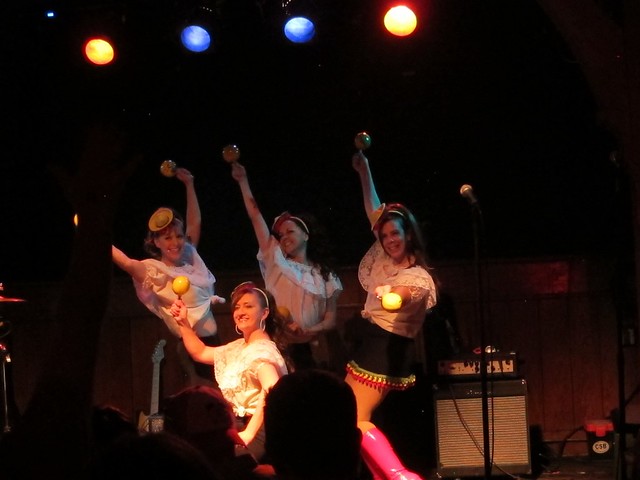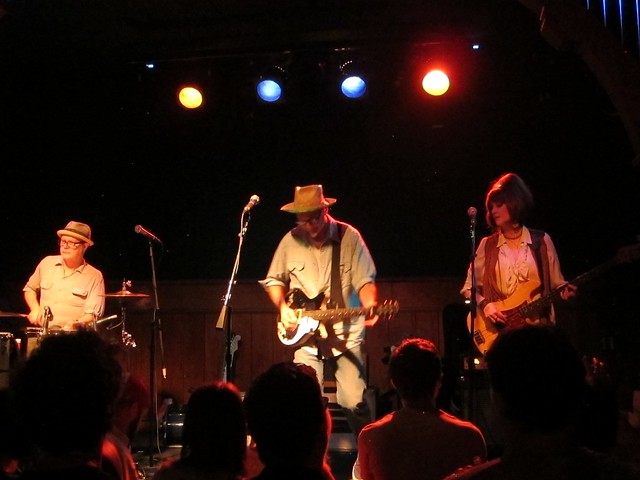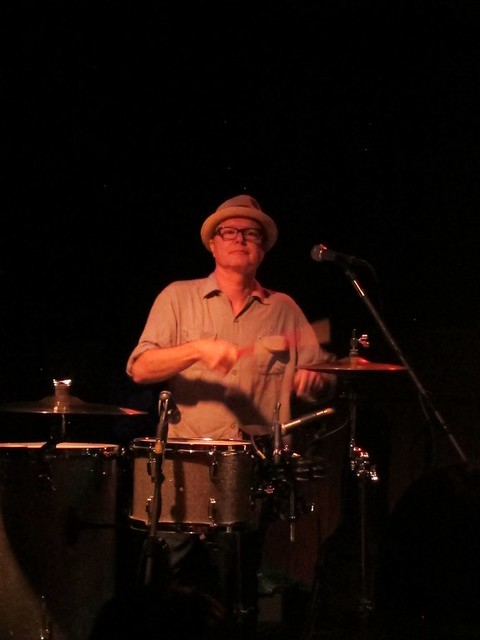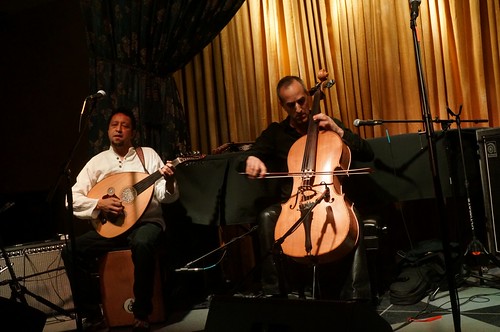Fringe music from the Middle Kingdom
3.75/5.0



 From skewed savants like Roky Erickson and Syd Barrett to modern mystics like Jim James and Wayne Coyne, psychedelic artists thrive out in the borderlands where the rules are flexibly vague and no one expects explanations. Beijing's Chui Wan has set up their own camp out in the fringes and, listening to their latest self-titled release, they've been raiding the ruins and scavenging from a host of influences to create their unique blend of experimental, new wave neo-psychedelia. Call it crypto-psych, where bits of avant garde Pere Ubu coexist with the Velvet Underground and Beatlesque musing drifts past Gothic new wave moodiness. Like steampunk fashion, it’s intriguing to encounter familiar things in unusual settings, but this album digs deeper than mere aesthetics. Psychedelic music is often invested in capturing a mood and Chui Wan’s music seems to reflect the uneasiness of change in their native country.
From skewed savants like Roky Erickson and Syd Barrett to modern mystics like Jim James and Wayne Coyne, psychedelic artists thrive out in the borderlands where the rules are flexibly vague and no one expects explanations. Beijing's Chui Wan has set up their own camp out in the fringes and, listening to their latest self-titled release, they've been raiding the ruins and scavenging from a host of influences to create their unique blend of experimental, new wave neo-psychedelia. Call it crypto-psych, where bits of avant garde Pere Ubu coexist with the Velvet Underground and Beatlesque musing drifts past Gothic new wave moodiness. Like steampunk fashion, it’s intriguing to encounter familiar things in unusual settings, but this album digs deeper than mere aesthetics. Psychedelic music is often invested in capturing a mood and Chui Wan’s music seems to reflect the uneasiness of change in their native country.
At its most positive, that nervous energy can be tied to opportunity and the most upbeat track, “Vision”, seems intent on grasping the chance even as it continually mutates and slips away. The tight rhythm and jungle beat drums are fixtures, along with the guitar pushing simple melodies to the forefront, but the song evolves in several directions. Initially, despite the guitar, it has an electronic feel that reminds me of the programmed rhythm on the.Clash’s "Overpowered By Funk". By the time the vocals come in, the tone has shifted into a Bauhaus cum Krautrock groove. Chameleon-like, the focal riffs come and go in waves, until the piece transcends the relentless reinvention to reveal that the true answer can be found in the hypnotically syncopated drum jam. It seems to say that, faced with constant change, the best thing to do is move with it. It would be easy to imagine a 20 minute extended version rattling the walls in a dark, trippy basement club, but the four minutes on Chui Wan is merely a tease.
After this restless drive of “Vision”, the band shifts gears for “On the Other Ocean”. If the former was strongly directed, the latter offers fun house reflections of a hallucinogenic expedition. The jangling new age start suggests a spacy milieu somewhere between Star Trek and music from the “Hearts of Space”. Once the vocals come in, the context becomes more overtly psychedelic but retains the unanchored feel. Chiming melodic harmonies suggest a more traditional Chinese influence, but the detuned and watery, off-kilter vibe adds a spacious decadence. If this is the start of a journey, it’s hard to tell what it might be in search of. Ultimately, the track slips into an even looser jazz interlude before faltering and melting into a puddle. That ending isn't a disappointment, though. Rather, it’s just a natural waking from the dream.
The rest of the tracks on Chui Wan find still stranger worlds to visit, from the off-balanced Pere Ubu carnival of “Seven Chances” to the nervous new wave tension of “Only” or the Velvet Underground folk-psych pop of “Silence” (think of Nico singing, “I’ll Be Your Mirror”). The weirdest is the hot mess that closes out the album, “Beijing is Sinking”. The metal flake guitar intro gives way to an odd poppish bounce. Imagine bits of Pink Floyd's "San Tropez", John Lennon's "Number 9 Dream ", and maybe a touch of OK Go coming together in a mulligatawny stew. Some three minutes in, there’s a solo section that develops a nice meandering riff. Enjoy it while it lasts, because, all too soon, it’s overwhelmed by chaotic guitar and transitions into an extended psychedelic outro that’s longer than the initial structured interval.
But the stylistic mashups and nomadic song development are hardly detrimental to Chui Wan’s mission. Out where they play, landmarks shift -- Beijing is still sinking, after all -- and the point is to step beyond the maps.
Here's a taste from the album:
3.75/5.0




 From skewed savants like Roky Erickson and Syd Barrett to modern mystics like Jim James and Wayne Coyne, psychedelic artists thrive out in the borderlands where the rules are flexibly vague and no one expects explanations. Beijing's Chui Wan has set up their own camp out in the fringes and, listening to their latest self-titled release, they've been raiding the ruins and scavenging from a host of influences to create their unique blend of experimental, new wave neo-psychedelia. Call it crypto-psych, where bits of avant garde Pere Ubu coexist with the Velvet Underground and Beatlesque musing drifts past Gothic new wave moodiness. Like steampunk fashion, it’s intriguing to encounter familiar things in unusual settings, but this album digs deeper than mere aesthetics. Psychedelic music is often invested in capturing a mood and Chui Wan’s music seems to reflect the uneasiness of change in their native country.
From skewed savants like Roky Erickson and Syd Barrett to modern mystics like Jim James and Wayne Coyne, psychedelic artists thrive out in the borderlands where the rules are flexibly vague and no one expects explanations. Beijing's Chui Wan has set up their own camp out in the fringes and, listening to their latest self-titled release, they've been raiding the ruins and scavenging from a host of influences to create their unique blend of experimental, new wave neo-psychedelia. Call it crypto-psych, where bits of avant garde Pere Ubu coexist with the Velvet Underground and Beatlesque musing drifts past Gothic new wave moodiness. Like steampunk fashion, it’s intriguing to encounter familiar things in unusual settings, but this album digs deeper than mere aesthetics. Psychedelic music is often invested in capturing a mood and Chui Wan’s music seems to reflect the uneasiness of change in their native country.At its most positive, that nervous energy can be tied to opportunity and the most upbeat track, “Vision”, seems intent on grasping the chance even as it continually mutates and slips away. The tight rhythm and jungle beat drums are fixtures, along with the guitar pushing simple melodies to the forefront, but the song evolves in several directions. Initially, despite the guitar, it has an electronic feel that reminds me of the programmed rhythm on the.Clash’s "Overpowered By Funk". By the time the vocals come in, the tone has shifted into a Bauhaus cum Krautrock groove. Chameleon-like, the focal riffs come and go in waves, until the piece transcends the relentless reinvention to reveal that the true answer can be found in the hypnotically syncopated drum jam. It seems to say that, faced with constant change, the best thing to do is move with it. It would be easy to imagine a 20 minute extended version rattling the walls in a dark, trippy basement club, but the four minutes on Chui Wan is merely a tease.
After this restless drive of “Vision”, the band shifts gears for “On the Other Ocean”. If the former was strongly directed, the latter offers fun house reflections of a hallucinogenic expedition. The jangling new age start suggests a spacy milieu somewhere between Star Trek and music from the “Hearts of Space”. Once the vocals come in, the context becomes more overtly psychedelic but retains the unanchored feel. Chiming melodic harmonies suggest a more traditional Chinese influence, but the detuned and watery, off-kilter vibe adds a spacious decadence. If this is the start of a journey, it’s hard to tell what it might be in search of. Ultimately, the track slips into an even looser jazz interlude before faltering and melting into a puddle. That ending isn't a disappointment, though. Rather, it’s just a natural waking from the dream.
The rest of the tracks on Chui Wan find still stranger worlds to visit, from the off-balanced Pere Ubu carnival of “Seven Chances” to the nervous new wave tension of “Only” or the Velvet Underground folk-psych pop of “Silence” (think of Nico singing, “I’ll Be Your Mirror”). The weirdest is the hot mess that closes out the album, “Beijing is Sinking”. The metal flake guitar intro gives way to an odd poppish bounce. Imagine bits of Pink Floyd's "San Tropez", John Lennon's "Number 9 Dream ", and maybe a touch of OK Go coming together in a mulligatawny stew. Some three minutes in, there’s a solo section that develops a nice meandering riff. Enjoy it while it lasts, because, all too soon, it’s overwhelmed by chaotic guitar and transitions into an extended psychedelic outro that’s longer than the initial structured interval.
But the stylistic mashups and nomadic song development are hardly detrimental to Chui Wan’s mission. Out where they play, landmarks shift -- Beijing is still sinking, after all -- and the point is to step beyond the maps.
Here's a taste from the album:

 It's no coincidence that the cover of Little Earthquakes (1992) shows her emerging from her box. The airbrushed redhead from Y Kant Tori Read returned to her classical piano roots and found her sound, but more importantly found her voice. At first glance, she may have seemed like a normal singer-songwriter with solid vocal chops and pretty keyboard riffs, but she turned out to be a feminist poet with a talent for strong imagery and a yen to draw back the curtain on her own experiences. The piano and backing string arrangements reminded people of Joni Mitchell or Kate Bush, but her lyrics had a touch of Patti Smith and Lou Reed, yielding songs that flowed fluidly between ethereal beauty and self-aware grit. On Little Earthquakes, she processed and rejected a lifetime of repression, especially seen through lenses of gender and religion. Her authenticity was as honest as punk rock, but its strength came from its assertive vulnerability: she embraced her emotions but had the distance to put them into perspective.
It's no coincidence that the cover of Little Earthquakes (1992) shows her emerging from her box. The airbrushed redhead from Y Kant Tori Read returned to her classical piano roots and found her sound, but more importantly found her voice. At first glance, she may have seemed like a normal singer-songwriter with solid vocal chops and pretty keyboard riffs, but she turned out to be a feminist poet with a talent for strong imagery and a yen to draw back the curtain on her own experiences. The piano and backing string arrangements reminded people of Joni Mitchell or Kate Bush, but her lyrics had a touch of Patti Smith and Lou Reed, yielding songs that flowed fluidly between ethereal beauty and self-aware grit. On Little Earthquakes, she processed and rejected a lifetime of repression, especially seen through lenses of gender and religion. Her authenticity was as honest as punk rock, but its strength came from its assertive vulnerability: she embraced her emotions but had the distance to put them into perspective. If that first solo album tried to erase the bitter memory of Y Kant Tori Read, two years later, she had become confident enough to integrate more of her rock and pop side into her music. Under the Pink still had the piano foundation, but Amos was willing to tap into a stronger rock feel on some songs, adding fuzzed guitar and harder edges. The richer stylistic palette gave the collection a more immediate feel. Like Little Earthquakes, though, these songs were the opposite of pop fluff. Even when she followed a verse-chorus structure, her progressions offered nice surprises and she gave her artier side free rein on songs like "Bells For Her".
If that first solo album tried to erase the bitter memory of Y Kant Tori Read, two years later, she had become confident enough to integrate more of her rock and pop side into her music. Under the Pink still had the piano foundation, but Amos was willing to tap into a stronger rock feel on some songs, adding fuzzed guitar and harder edges. The richer stylistic palette gave the collection a more immediate feel. Like Little Earthquakes, though, these songs were the opposite of pop fluff. Even when she followed a verse-chorus structure, her progressions offered nice surprises and she gave her artier side free rein on songs like "Bells For Her".














